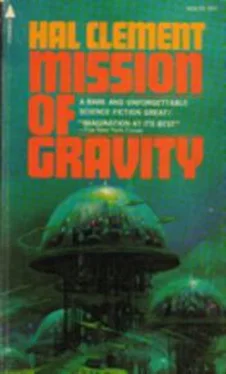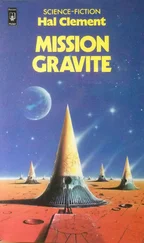Hal Clement - Mission of Gravity
Здесь есть возможность читать онлайн «Hal Clement - Mission of Gravity» весь текст электронной книги совершенно бесплатно (целиком полную версию без сокращений). В некоторых случаях можно слушать аудио, скачать через торрент в формате fb2 и присутствует краткое содержание. Жанр: Фантастика и фэнтези, на английском языке. Описание произведения, (предисловие) а так же отзывы посетителей доступны на портале библиотеки ЛибКат.
- Название:Mission of Gravity
- Автор:
- Жанр:
- Год:неизвестен
- ISBN:нет данных
- Рейтинг книги:4 / 5. Голосов: 1
-
Избранное:Добавить в избранное
- Отзывы:
-
Ваша оценка:
- 80
- 1
- 2
- 3
- 4
- 5
Mission of Gravity: краткое содержание, описание и аннотация
Предлагаем к чтению аннотацию, описание, краткое содержание или предисловие (зависит от того, что написал сам автор книги «Mission of Gravity»). Если вы не нашли необходимую информацию о книге — напишите в комментариях, мы постараемся отыскать её.
Mission of Gravity — читать онлайн бесплатно полную книгу (весь текст) целиком
Ниже представлен текст книги, разбитый по страницам. Система сохранения места последней прочитанной страницы, позволяет с удобством читать онлайн бесплатно книгу «Mission of Gravity», без необходимости каждый раз заново искать на чём Вы остановились. Поставьте закладку, и сможете в любой момент перейти на страницу, на которой закончили чтение.
Интервал:
Закладка:
For two or three minutes, while the sun moved far enough to reveal most of the areas* previously in shadow, they waited and watched; but nothing except the shadows moved, and finally Lackland started ‘the tank once more. The sun set while they were descending the slope. The tank had only one searchlight, which Lackland kept aiming at the ground in his path; so they could not see what, if anything, went on among the stones above. Sunrise found them just crossing another brook, and tension mounted as they headed uphill once more. For a minute or two nothing was visible, as the sun was directly ahead of the travelers; then it rose far enough to permit clear forward vision. None of the eyes fastened on the hilltop could detect any change from its appearance of the night before. There was a vague impression, which Lackland found was shared by the Mesklinites, that there were now more stones; but since no one had attempted to make a count of them before, this could not be proved. There was still no visible motion.
It took five or six minutes to climb the hill at the tank’s five-mile speed, so the sun was definitely behind them when they reached the top. Lackland found that several of the gaps between the larger stones were wide enough for the tank and sled, and he angled toward one of these as he approached the crest of the ridge. He crunched over some of the smaller boulders, and for a moment Dondragmer, on the ship behind, thought one of them must have damaged the tank; for the machine came to an abrupt halt. Barlennan could be seen still on top of the vehicle, all his eyes fixed on the scene below him; the Flyer was not visible, of course, but after a moment the Bree’s mate decided that he, too, must be so interested in the valley beyond as to have forgotten about driving.
„Captain! What is it?” Dondragmer hurled the question even as he gestured the weapons crew to the flame tanks. The rest of the crew distributed themselves along the outer rafts, clubs, knives, and spears in readiness, without orders. For a long moment Barlennan gave no answer, and the mate was on the point of ordering a party overboard to cover the tank — he knew nothing of the nature of the jury-rigged quick-firer at Lackland’s disposal — when ‘his captain.turned, saw what was going on, and gave a reassuring gesture.
„It’s all right, I guess,” he said. „We can see no one moving, but it looks a little like a town. Just a moment and the Flyer will pull you forward so that you can see without going overboard.” He shifted back to English and made this request to Lackland, who’promptly complied. This action produced an abrupt change in the situation.
What Lackland had seen at first — and Barlennan less clearly — was a broad, shallow, bowllike valley entirely surrounded by hills of the type they were on. There should, Lackland felt, have been a lake at the bottom; there was no visible means of escape for rain or melted snow. Then he noticed that there was no snow on the inner slopes of the hills; their topography was bare. And strange topography it was.
It could not possibly have been natural. Starting a short distance below the ridges were broad, shallow channels. They were remarkably regular in arrangement; a cross section of the hills taken just below where they started would have suggested a very pretty series of ocean waves. As the channels led on downhill toward the center of the valley they grew narrower and deeper, as though designed to lead rain water toward a central reservoir. Unfortunately for this hypothesis, they did not all meet in the center — they did not even all reach it, though all got as far as the relatively level, small floor of the valley. More interesting than the channels themselves were the elevations separating them. These, naturally, also grew more pronounced as the channels grew deeper; on the upper half of the slopes they were smoothly rounded ridges, but as the eye followed them down their sides grew steeper until they attained a perpendicular junction with the channel floors. A few of these little walls extended almost to the center of the valley. They did not all point toward the same spot; there were gentle curves in their courses that gave them the appearance of the flanges of a centrifugal pump rather than the spokes of a wheel. Their tops were too narrow for a man to walk on.
Lackland judged that channels and separating walls alike were some fifteen or twenty feet wide where they broke off. The walls themselves, therefore, were quite thick enough to be lived in, especially for Mesklinites; and the existence of numerous openings scattered over their lower surfaces lent strength to the idea that they actually were dwellings. The glasses showed that those openings not directly at the bottoms of the walls had ramps leading up to them; and before he saw a single living thing, Lackland was sure he was examining a city. Apparently the inhabitants lived in the separating walls, and ‘had developed the entire structure in order to dispose of rain. Why they did not live on the outer slopes of the hills, if they wanted to avoid the liquid, was a question that did not occur to him.
He had reached this point in his thoughts when Barlennan asked him to pull the Bree over the brow of the hill before the sun made good seeing impossible. The moment the tank began to move, a score of dark figures appeared in the openings that he had suspected were doorways; no details were visible at that distance, but the objects, whatever they were, were living creatures. Lackland heroically refrained from stopping the tank and snatching up the glasses once more until he had pulled the Bree into a good viewing position.
As it turned out, there was no need for him to have hurried. The things remained motionless, apparently watching the newcomers, while the towing maneuver was completed; he was able to spend the remaining minutes before sunset in a careful examination of the beings. Even with the glasses some details were indistinguishable — for one reason, they seemed not to have emerged entirely from their dwellings; but what could be seen suggested strongly that they belonged to the same race as Barlennan’s people. The bodies were long and caterpillarlike; several eyes — they were hard to count at that distance — were on the foremost body segment, and limbs very similar to if not identical with Barlennan’s pincer-equipped arms were in evidence. The coloration was a mixture of red and black, the latter predominating, as in the Bree’s complement.
Barlennan could not see all this, but Lackland relayed the description to him tensely until the city below faded from sight in the dusk. When he stopped talking the captain issued a boiled-down version in his own language to the tensely waiting crew. When that was done Lackland asked:
„Have you ever heard of people living this close to the Rim, Barl? Would they be at all likely to be known to you, or even speak the same language?”
„I doubt it very much. My people become very uncomfortable, as you know, north of what you once called the hundred-G line.’ I know several languages, but I can’t see any likelihood of finding one of them spoken here.”
„Then what shall we do? Sneak around this town, or go through it on the chance its people are not belligerent? I’d like to see it more closely, I admit, but we have an important job to do and I don’t want to risk its chances of success. You at least know your race better than I possibly can; how do you think they’ll react to us?”
„There’s no one rule, there. They may be frightened out of their wits at your tank, or my riding on it — though they might not have normal instincts about height, here at the Rim. We’ve met lots of strange people in our wanderings, and sometimes we’ve been able to trade and sometimes we’ve had to fight. In general, I’d say if we kept weapons out of sight and trade goods in evidence, they would at least investigate before getting violent. I’d like to go down. Will the sled fit through the bottom of those channels, do you think?”
Читать дальшеИнтервал:
Закладка:
Похожие книги на «Mission of Gravity»
Представляем Вашему вниманию похожие книги на «Mission of Gravity» списком для выбора. Мы отобрали схожую по названию и смыслу литературу в надежде предоставить читателям больше вариантов отыскать новые, интересные, ещё непрочитанные произведения.
Обсуждение, отзывы о книге «Mission of Gravity» и просто собственные мнения читателей. Оставьте ваши комментарии, напишите, что Вы думаете о произведении, его смысле или главных героях. Укажите что конкретно понравилось, а что нет, и почему Вы так считаете.












